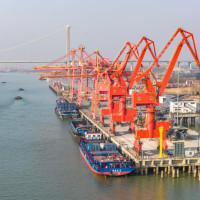- Thursday, 15 January 2026
Lumbini Ceramics starts production of Laminar tiles
Gulariya, Nov. 29: Newly established Lumbini Ceramics Limited has started production from its plant in Gulariya Municipality-9, Bardiya. The Rs. 4 billion industrial project is spread in an area of about 12.5 bigahas. The company began trial production from mid-August this year.
With a daily production capacity of 140,000 square feet and an annual capacity of 41.5 million square feet, the company is poised to meet a significant portion of the domestic demand. It is set to utilise up to 80 per cent of the production capacity in the first year.
Equipped with cutting-edge technology sourced from Italy, Spain, China, and India, Laminar Tiles specialises in 100 per cent vitrified tiles—products with high durability, water resistance, and design versatility. The vitrified tiles are produced in a variety of finishes and surfaces such as matt, glossy, high-gloss, matt carving, grip-9, trumatt, full body and planks. They are 99.92 per cent water resistant.
The Nepali tiles industry is experiencing a transformative shift, driven by the emergence of local manufacturing. Up until the onset of COVID-19 pandemic, Nepal's demand of tiles was met with imported products with 99 per cent of them imported from Indian manufacturers. In 2019, Nepal imported tiles worth approximately Rs. 10.5 billion.
This heavy reliance on imports not only drained foreign currency reserves of the country but also limited the availability of tailored solutions for local consumers. Recognising this, Laminar Tiles has stepped up to address the demand through local production, the company stated.
However, in the aftermath of the pandemic, Nepal has seen strong growth in the tile manufacturing sector. "Given the rise of local manufacturing facilities for tiles, we expect import substitution to happen. Nepal should become completely self-reliant for tile consumption over the next few years. Nepal’s tile consumption per capita is lower than countries in the region. Tile consumption should further increase as well," Director of Lumbini Ceramics, Abhinav Churiwal expressed his hopes.
According to him, the company aims at replacing the entire tiles imports and make Nepal self-reliant in tiles products within a few years. The shift to local manufacturing not only reduces Nepal’s trade deficit but also ensures faster delivery, greater variety, and customisation options for consumers.
The company has created more than 300 jobs, and also plans to engage more local talent in its factory. While senior technical personnel have been hired from abroad to ensure operational excellence, the majority of the workforce comprises Nepali citizens.
Elevating standards
The company’s use of advanced Italian glaze and proprietary technologies like Grip9, TruMatt, and full-body tiles ensures products that are durable, aesthetically pleasing, and tailored to Nepali needs, Churiwal said.
Grip9 tiles are designed to provide enhanced safety in wet environments, making them ideal for terraces, parking areas, and balconies while TruMatt products offer an abrasion-resistant surface suited for high-traffic commercial spaces.
The company has over 500 different tiles that differ in design, size, finish, and usage and are divided into 10 collections.
Multiple quality control measures applying human experts and digital technology are installed and applied along about 1.5 km length of the processing and production plant.
"Using a coal-fired furnace heated to 1,200°C, the tiles undergo precise finishing to achieve smooth, resilient surfaces. Each batch is subjected to strict quality control measures, ensuring durability, design excellence, and affordability," said the company.
The factory consumes about 3.5 MW of electricity while the furnace is heated with the coal. Churiwal said that coal is used to heat the furnace in absence of the technology that makes the use of electricity possible for the same task.
Tapping into a growing market
Despite its nascent stage, Nepal’s tiles industry holds immense potential. The country’s per capita tile consumption remains lower than that of regional counterparts, signaling room for growth. As construction activities pick up, the demand for tiles across residential, commercial, and public infrastructure projects is expected to rise. This is where Lumbini Ceramics wants to strike the chord.
"Laminar Tiles is already catering to a diverse clientele, including homeowners, architects, contractors, and developers. Its wide product range spans various applications—from residential walls and floors to commercial facades and high-traffic public spaces," said Churiwal. With over 500 designs and a variety of finishes such as matt, glossy, and high gloss, the company is triving to meet the aesthetic and functional preferences of Nepali consumers.
The company has given priority to environmental sustainability as well. With the implementation of dust and pollution control measures, along with sewage, effluent, and waste treatment plants to minimise its environmental footprint, the production areas of the factory looks comparatively dust-free and clean.
Its future plans include the establishment of a biogas plant to manage organic waste and conserve energy.
Economic slowdown
The economic slowdown gripping Nepal for the past two years has seriously impacted the construction business which is the major demand sector for the tiles.
However, Churiwal is optimistic about the future. "While our current focus is on meeting domestic demand, we expect exporting its products in the long term, bringing foreign currency into Nepal," he said. As the market matures, the company also hopes to see clearer quality standards and greater consumer awareness regarding tile categories and applications.
According to the company, the current economic downturn which has resulted in a construction slowdown is perhaps the biggest challenge being faced by any construction-related industry, including tiles.
Meanwhile, given the number of facilities coming up, overcapacity may also be a problem going forward. Likewise, the lack of training for tile installation workers has made tiles more expensive to install than purchase while there is also the lack of proper equipment required to install tiles.





-square-thumb.jpg)


-square-thumb.jpg)




-original-thumb.jpg)



